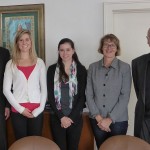Funding Your Study Abroad
Students from the University of Wisconsin-Madison, University of Michigan, Michigan State University and University of Iowa are directed to their study abroad offices for questions regarding program cost and estimated additional expenses. As each university handles financial matters separately, your home university study abroad office will have the most accurate information regarding costs and billing procedures.
Non-consortium students should consult the UW-Madison program website.
Students attending a Big Ten university affialiated with the Big Ten Academic Alliance SPA network may be able to participate in AYF at a reduced fee. Students from Big Ten schools are asked to consult their study abroad office about possible Academic Year in Freiburg participation at a reduced rate and home university fees. UW-Madison program advisor Andy Quackenbush will be happy to assist with any open questions. This may apply to you, if you study at
- University of Illinois
- Indiana University
- University of Maryland
- University of Nebraska-Lincoln
- Northwestern University
- Ohio State University
- Pennsylvania State University
- Purdue University
- or Rutgers University-New Brunswick
Students from the University of Minnesota enjoy reciprocity.
Depending on the institution, financial aid may be used to cover study abroad costs. Check with your home university study abroad office for information on how financial aid may be applied towards the cost of the program and what other funding opportunities are available.
Expenses not covered by the program fee, such as transportation to and from Freiburg, room and board, daily living expenses and vacation travel should be included when preparing personal study abroad budgets.
Estimated Cost
The Academic Year in Freiburg program is very competitively priced. Program cost information and an estimate of total cost are available on the UW-Madison program website and in the Money matters section of this website.
Students from the University of Michigan, Michigan State University and University of Iowa are directed to their study abroad offices for questions regarding program cost and estimated additional expenses. As each AYF partner university handles financial matters separately, your home university study abroad office will have the most accurate information regarding costs and billing procedures.
Non-Consortium and UW-Madison students please contact the Office of International Academic Programs at the UW-Madison for additonal information.
Scholarship Opportunities
 Several high-profile competitive grant programs such as the Baden-Württemberg Scholarship can be used to fund your year in Freiburg with AYF.
Several high-profile competitive grant programs such as the Baden-Württemberg Scholarship can be used to fund your year in Freiburg with AYF.
Additionally, your home university may have fellowships dedicated to supporting students on and off campus. Please talk to your study abroad advisor about such opportunities on your home campus.
Below you’ll find a list of other sources of funding for study abroad which can also be applied to AYF:
- Foundation for Global Scholars
- Fund for Education Abroad
- Benjamin A. Gilman International Program
- Boren Awards for International Study
- Corinne Jeannine Schillings Foundation
- Golden Key Study Abroad Scholarships
- Phi Kappa Phi Study Abroad Grants
Below you’ll find a list of general financial and study abroad-specific databases:
Working in Germany
As an AYF student with a student visa, you are permitted to work in Germany for up to 240 half days (no more than 4 hours/day) or 120 full days (anything more than 4 up to 8 hours/day) a year.
Previously, students have found work in local restaurants, shops, and schools (English tutoring), telemarketing and other companies.
AYF usually also has several openings for student help (office assistants, computer assistant).
You can find more information about finding student work in Freiburg via the Studierendenwerk Freiburg (student services) job portal.

